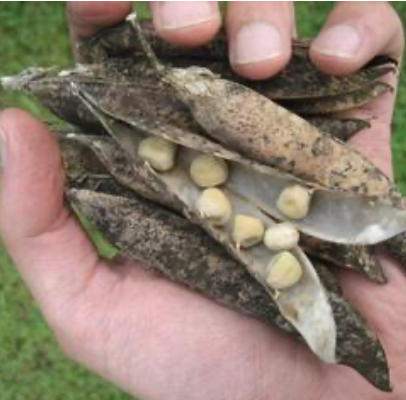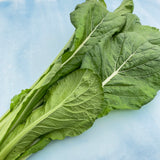
Time to Go A-Roguing
Hello seed-savers! I hope your gardens are happily growing and blooming. It is time to be thinking about saving seeds from your Seed Library plants. But first, it is time to discover your inner rogue. This is one of the most difficult seed-saving moments of the season, but it is absolutely necessary. Feel comforted: by letting your rogue gardener out, you are preserving the flavors, beauty, and history of the plants in your garden.
It's true: seed-savers are rogues. If you were a bee taking a break from busily pollinating the parsnips in my garden, you would see me mischievously pulling plants out by their roots and savagely tossing them into the compost pile. But why? Buzz closer and take a look. On careful inspection you would see that the Purple Podded Pea plants I pulled were not healthy and purple. They were green or mottled, stunted or odd. Roguing out a plant means saving seeds only from those specimens that are growing true to type and are disease free. Without this activity the unique genetics--and therefore flavors, beauty, and other characteristics--of the pea would be lost. The next generation of Purple Podded Peas might not be purple!
So, your seed-sense task this week is to go out to your gardens, channel the rogue, and pull out any of your Seed Library plants that are not growing what they are supposed to. Feel free to eat (when appropriate) the plants you have pulled. There may be nothing to pull, but it’s worth a look. While you're at it, let us know how your Seed Library seeds germinated and grew. Hearing from gardeners helps us keep our seeds healthy!
A few common things to rogue for:
Tomatoes- Check leaf shape. Make sure that they are correctly potato leafed or tomato leafed.
Purple Podded Peas- Check for colored (not white) blooms and fully purple pods.
Lettuce- Look for correct coloring and shape and rogue any that are diseased with mildew or rot.
Beans- Pull out stunted or misshapen plants.
Special note for gardening in the rain:
It’s been raining here for weeks. Some of our seed crops are sitting in 6 inch water or floundering in the saturated mud. We’ve also had to delay some plantings due to the flooding in our fields. The soil is just too sticky to work. Although we could be out there in waders weeding, pruning, and staking we are not. Why? These moist conditions breed disease. Many common plant diseases are spread through contact when conditions are wet. I’m not going to continue roguing until it has stopped raining and the plants themselves have dried out a bit.
Next post when the tide recedes.
-Ken
 Which one of these things is not like the other?
Which one of these things is not like the other? Doug roguing peas
Doug roguing peas





